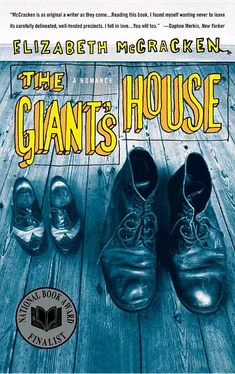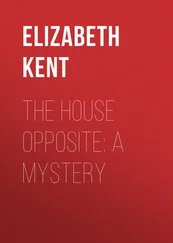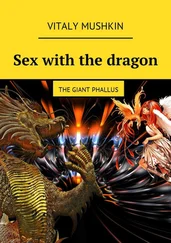“Oscar,” I said. “Alice is fine. By the time James was her age, he was already growing.”
“I know.” Still, it seemed possible to him, her head expanding without the permission of the rest of her body. Like the comic books of the time, maybe, which he read: babies exposed to radiation who grew not only large but scaly and bug-eyed. One day he might wake up to find himself the father of the Turtle Girl of Cape Cod. Jimmy Olsen was always getting in scrapes like that, and when he did, he never recognized Superman.
The summer tourists didn’t help. If Alice were around, they’d say, “Is this his little sister? She big for her age? She gonna be a giantess?”
“No,” Oscar would say. “She’s just an ordinary height. And she’s his cousin, not sister.”
“But still growing,” a tourist would say, smiling, making it sound like a dark prediction.
Even though Oscar hated it, the visitors kept coming. All day long people showed up at the cottage. The locals would knock shyly. The tourists knocked raucously or not at all. They ignored my Do Not Disturb sign.
“Is this the place—” they’d say, opening the door. “Whoops! Guess it must be.”
Mostly they didn’t have questions, unless, of course, it was whether there were any souvenirs to be had.
“This is someone’s house ,” I told them. “It is not a tourist trap.”
“You could make some money,” they said. “Think about it.”
Most of the tourists were meltingly the same: families with one, two, or three children; portions of church tours (the tours themselves always had the sense not to come all at once, or else did not know about us); couples of which one member was an eager reader of the newsmagazines that occasionally profiled James as if he were a celebrity. They took his picture, had me take his picture with them, and sometimes sent a print when they’d returned home, as if he, too, would want a memento of the meeting.
A few of the visitors I remember with more clarity. A classics professor who’d come into the library, wanting to read town records (he’d mistakenly believed that one of his forebears had passed through Brewsterville), followed me after work and presented James with an ancient pen and pencil set, inscribed with the name of a bank. A middle-aged lady with dyed-black hair, a wide painted mouth, and an artificial beauty mark told stories of being a silent movie starlet; there was something Egyptian about her, and her ears were unfashionably pierced and hung with thick gold hoops. I did not believe her stories of the Sisters Gish and Mister Griffith, but when she died a year later, the Boston Globe carried her obituary with a photograph: the same black hair and dark lips, the same beauty mark more artfully applied, the gold earrings, and a cheroot brandished between her tiny fingers. The copy below said that records were so unclear, she might have been fifty-nine, sixty-nine, or eighty at the time of her death.
One tall man seemed both delighted and depressed by James’s size. “I’m six foot ten myself, and I felt outta place all my life. But then again, I ain’t as handsome as you,” he told James, and in fact he wasn’t: his features were thick and flat, like callouses; his voice sounded as though it came from a cave. He seemed like the friendliest, saddest monster I ever met. (By then I could diagnose it: acromegaly, the condition that results when the pituitary gland continues to produce even when the body has stopped growing in altitude. James, who never stopped growing, therefore never suffered.) This man had quit his job and was moving to California. To be an actor? we asked. Close, he said, professional wrestler; he’d met a man who’d promised him a job. “Lots of money in it,” he told James.
The visitors — both tourists and people from town — bore gifts, told their friends, wrote back. Their visits were formal, natives come to gawk at a tree that has grown in a strange holy shape. They brought things they thought he would like: big-print books (he was nearsighted, that was all), round serving platters to use as dinner plates, unabridged dictionaries. Assuming any large thing would please him, make him feel normal-sized, they offered up huge slices of fudge and casseroles cooked in Dutch ovens.

James took up painting that summer. Oscar had encouraged him to give it a try, and now that people were likely to drop by the cottage, it seemed only right to look busy. That way James could set down the brush and invite them graciously in. He started with paint-by-number sets, then moved on to watercolors, he explained, because he liked their easy, curvaceous effect. I didn’t know what this meant. At first he did nothing but ocean scenes, though he never went to the beach, sand being too tricky a surface for his feet; they were naive, trusting feet, assumed every surface was flat and unmoving. After a while he started painting interiors of his cottage.
“What happened to the ocean?” Oscar asked him. “For my money, it’s a lot more interesting than your chair. Centuries of artists agree with me.”
“I did the ocean till I figured out what I was doing,” James answered. “No matter what, I could always get it to look like the ocean. Now that I’ve got the hang of it, I’m moving on to harder things.”
“The ocean’s hard,” said Oscar, his feelings hurt. “Ask Turner. Ask Winslow Homer.”
But James didn’t catch his tone. He said, “The ocean just came too easy for me.”
I offered to be James’s secretary, to sort through his letters, but he wanted to do that himself. Every day he got at least one piece of correspondence; if it was someone who’d written before, who’d received an answer, it would be addressed to James Sweatt, 9 Winthrop St Back . The Back guaranteed that the mailman would bring the letters directly to the cottage, where Oscar had installed a box, instead of depositing them at the front house for the Stricklands to sort and carry.
“How do you keep up with this?” I asked.
“I manage.”
I began sorting through the day’s mail, which I’d gotten from the mailbox. “Oregon, Illinois—”
“Peggy! Don’t look at my mail, please. It’s private.”
“I’m not reading it. I’m only looking at the envelopes.”
“Well, stop,” he said. But I had my hand on a postcard. I didn’t read the body of it, and I didn’t have time to look at the postmark, but it was clearly signed, your father, C. Sweatt .
I stacked the pile neatly, shuffled Mr. Sweatt to the center of the deck. “I’ve stopped,” I said, but I stared at the top envelope, the one with the Oregon postmark.
“They all from strangers?” I asked at last.
“Mostly,” he said. “Here, give them to me.” He set them down on the corner of the desk and turned back to what he was writing.
“Aren’t you going to read them?” I wanted to be there when James finally got word of his father; I wanted to know what Mr. Sweatt had to say for himself.
“Eventually.”
I sat down. I stared at his back. He finished his letter, folded it, put it in an envelope. Then he began another.
“James,” I said.
“What?”
“Why don’t you look at your mail.”
“I will.”
“James.”
“Peggy, ” he said, exasperated.
“There’s a card from your father.”
So he picked up the stack, not looking at me, and flipped through. I tried to see whether he lingered at the postcard, but his back was turned to me and I couldn’t tell.
“Yes,” he said finally. “You’re right.”
“What does he say?”
James sighed. “The usual.” He turned to me, held the postcard up to the light for a second, as if it were instead a sealed letter he was not supposed to read. Then he opened a desk drawer and dropped it in. “I’ll put it with the rest.”
Читать дальше













